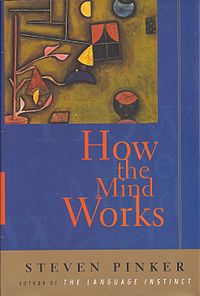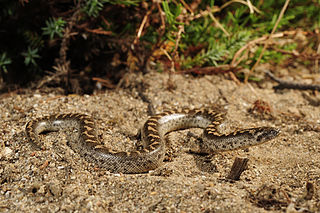Evolutionary psychology is a theoretical approach in psychology that examines cognition and behavior from a modern evolutionary perspective. It seeks to identify human psychological adaptations with regards to the ancestral problems they evolved to solve. In this framework, psychological traits and mechanisms are either functional products of natural and sexual selection or non-adaptive by-products of other adaptive traits.
Modularity of mind is the notion that a mind may, at least in part, be composed of innate neural structures or mental modules which have distinct, established, and evolutionarily developed functions. However, different definitions of "module" have been proposed by different authors. According to Jerry Fodor, the author of Modularity of Mind, a system can be considered 'modular' if its functions are made of multiple dimensions or units to some degree. One example of modularity in the mind is binding. When one perceives an object, they take in not only the features of an object, but the integrated features that can operate in sync or independently that create a whole. Instead of just seeing red, round, plastic, and moving, the subject may experience a rolling red ball. Binding may suggest that the mind is modular because it takes multiple cognitive processes to perceive one thing.

The Wason selection task is a logic puzzle devised by Peter Cathcart Wason in 1966. It is one of the most famous tasks in the study of deductive reasoning. An example of the puzzle is:
You are shown a set of four cards placed on a table, each of which has a number on one side and a color on the other. The visible faces of the cards show 3, 8, blue and red. Which card(s) must you turn over in order to test that if a card shows an even number on one face, then its opposite face is blue?
Steven Peter Russell Rose is an English neuroscientist, author, and social commentator. He is an emeritus professor of biology and neurobiology at the Open University and Gresham College, London.

How the Mind Works is a 1997 book by the Canadian-American cognitive psychologist Steven Pinker, in which the author attempts to explain some of the human mind's poorly understood functions and quirks in evolutionary terms. Drawing heavily on the paradigm of evolutionary psychology articulated by John Tooby and Leda Cosmides, Pinker covers subjects such as vision, emotion, feminism, and "the meaning of life". He argues for both a computational theory of mind and a neo-Darwinist, adaptationist approach to evolution, all of which he sees as the central components of evolutionary psychology. He criticizes difference feminism because he believes scientific research has shown that women and men differ little or not at all in their moral reasoning. The book was a Pulitzer Prize Finalist.

Not in Our Genes: Biology, Ideology and Human Nature is a 1984 book by the evolutionary geneticist Richard Lewontin, the neurobiologist Steven Rose, and the psychologist Leon Kamin, in which the authors criticize sociobiology and genetic determinism and advocate a socialist society. Its themes include the relationship between biology and society, the nature versus nurture debate, and the intersection of science and ideology.

A psychological adaptation is a functional, cognitive or behavioral trait that benefits an organism in its environment. Psychological adaptations fall under the scope of evolved psychological mechanisms (EPMs), however, EPMs refer to a less restricted set. Psychological adaptations include only the functional traits that increase the fitness of an organism, while EPMs refer to any psychological mechanism that developed through the processes of evolution. These additional EPMs are the by-product traits of a species’ evolutionary development, as well as the vestigial traits that no longer benefit the species’ fitness. It can be difficult to tell whether a trait is vestigial or not, so some literature is more lenient and refers to vestigial traits as adaptations, even though they may no longer have adaptive functionality. For example, xenophobic attitudes and behaviors, some have claimed, appear to have certain EPM influences relating to disease aversion, however, in many environments these behaviors will have a detrimental effect on a person's fitness. The principles of psychological adaptation rely on Darwin's theory of evolution and are important to the fields of evolutionary psychology, biology, and cognitive science.
Leda Cosmides is an American psychologist, who, together with anthropologist husband John Tooby, pioneered the field of evolutionary psychology.
John Tooby was an American anthropologist who, together with his psychologist wife Leda Cosmides, pioneered the field of evolutionary psychology.
Donald Symons was an American anthropologist best known as one of the founders of evolutionary psychology, and for pioneering the study of human sexuality from an evolutionary perspective. He is one of the most cited researchers in contemporary sex research. His work is referenced by scientists investigating an extremely diverse range of sexual phenomena. Harvard psychologist Steven Pinker describes Symons' The Evolution of Human Sexuality (1979) as a "groundbreaking book" and "a landmark in its synthesis of evolutionary biology, anthropology, physiology, psychology, fiction, and cultural analysis, written with a combination of rigor and wit. It was a model for all subsequent books that apply evolution to human affairs, particularly mine." Symons is Professor Emeritus in the Department of Anthropology at the University of California, Santa Barbara. His most recent work, with Catherine Salmon, is Warrior Lovers, an evolutionary analysis of slash fiction.
Jerome H. Barkow is a Canadian anthropologist who works in the field of evolutionary psychology. He is a professor emeritus at Dalhousie University.
Evolutionary developmental psychology (EDP) is a research paradigm that applies the basic principles of evolution by natural selection, to understand the development of human behavior and cognition. It involves the study of both the genetic and environmental mechanisms that underlie the development of social and cognitive competencies, as well as the epigenetic processes that adapt these competencies to local conditions.

The Adapted Mind: Evolutionary Psychology and the Generation of Culture is a 1992 book edited by the anthropologists Jerome H. Barkow and John Tooby and the psychologist Leda Cosmides. First published by Oxford University Press, it is widely considered the foundational text of evolutionary psychology (EP), and outlines Cosmides and Tooby's integration of concepts from evolutionary biology and cognitive psychology, as well as many other concepts that would become important in adaptationist research.
Darwinian literary studies is a branch of literary criticism that studies literature in the context of evolution by means of natural selection, including gene-culture coevolution. It represents an emerging trend of neo-Darwinian thought in intellectual disciplines beyond those traditionally considered as evolutionary biology: evolutionary psychology, evolutionary anthropology, behavioral ecology, evolutionary developmental psychology, cognitive psychology, affective neuroscience, behavioural genetics, evolutionary epistemology, and other such disciplines.
Evolutionary psychology seeks to identify and understand human psychological traits that have evolved in much the same way as biological traits, through adaptation to environmental cues. Furthermore, it tends toward viewing the vast majority of psychological traits, certainly the most important ones, as the result of past adaptions, which has generated significant controversy and criticism from competing fields. These criticisms include disputes about the testability of evolutionary hypotheses, cognitive assumptions such as massive modularity, vagueness stemming from assumptions about the environment that leads to evolutionary adaptation, the importance of non-genetic and non-adaptive explanations, as well as political and ethical issues in the field itself.
A cognitive module in cognitive psychology is a specialized tool or sub-unit that can be used by other parts to resolve cognitive tasks. It is used in theories of the modularity of mind and the closely related society of mind theory and was developed by Jerry Fodor. It became better known throughout cognitive psychology by means of his book, The Modularity of Mind (1983). The nine aspects he lists that make up a mental module are domain specificity, mandatory operation, limited central accessibility, fast processing, informational encapsulation, "shallow" outputs, fixed neural architecture, characteristic and specific breakdown patterns, and characteristic ontogenetic pace and sequencing. Not all of these are necessary for the unit to be considered a module, but they serve as general parameters.
The history of evolutionary psychology began with Charles Darwin, who said that humans have social instincts that evolved by natural selection. Darwin's work inspired later psychologists such as William James and Sigmund Freud but for most of the 20th century psychologists focused more on behaviorism and proximate explanations for human behavior. E. O. Wilson's landmark 1975 book, Sociobiology, synthesized recent theoretical advances in evolutionary theory to explain social behavior in animals, including humans. Jerome Barkow, Leda Cosmides and John Tooby popularized the term "evolutionary psychology" in their 1992 book The Adapted Mind: Evolutionary Psychology and The Generation of Culture. Like sociobiology before it, evolutionary psychology has been embroiled in controversy, but evolutionary psychologists see their field as gaining increased acceptance overall.
Evolutionary psychology has traditionally focused on individual-level behaviors, determined by species-typical psychological adaptations. Considerable work, though, has been done on how these adaptations shape and, ultimately govern, culture. Tooby and Cosmides (1989) argued that the mind consists of many domain-specific psychological adaptations, some of which may constrain what cultural material is learned or taught. As opposed to a domain-general cultural acquisition program, where an individual passively receives culturally-transmitted material from the group, Tooby and Cosmides (1989), among others, argue that: "the psyche evolved to generate adaptive rather than repetitive behavior, and hence critically analyzes the behavior of those surrounding it in highly structured and patterned ways, to be used as a rich source of information out of which to construct a 'private culture' or individually tailored adaptive system; in consequence, this system may or may not mirror the behavior of others in any given respect.".

Social selection is a term used with varying meanings in biology.





